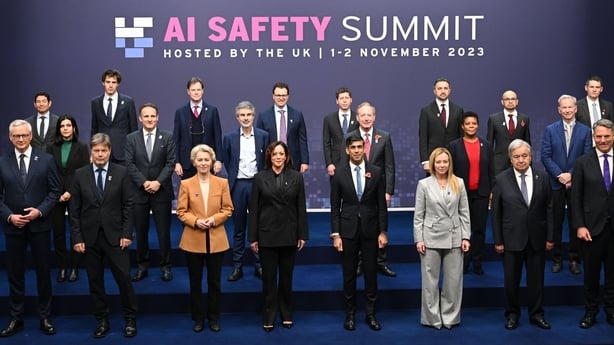SpaceX and Tesla CEO Elon Musk said it would be good for Britain, the United States and China to be aligned on the safety aspects of artificial intelligence at an event with British Prime Minister Rishi Sunak in London.
Mr Sunak interviewed Mr Musk on a small stage at Lancaster House today, one of the government's most opulent London venues which is often used for diplomatic functions.
Mr Musk backed China's inclusion in the first AI Safety Summit hosted at Bletchley Park, England, which over the past two days drew leading companies and nations together to agree initial steps on how to manage the risks of cutting-edge AI models.
Also at the summit, UN Secretary-General Antonio Guterres called for a "united, sustained, global" strategy to tackle the risks posed by artificial intelligence's rapid development.
He called for "new solutions" to close the gap between AI and its governance, proposing that it should be based on the UN Charter and the Universal Declaration of Human Rights.
Mr Guterres was joined by other political leaders including US Vice President Kamala Harris and EU chief Ursula von der Leyen at the two-day conference.
The UN chief urged lawmakers and regulators to "get ahead of the wave" of emerging AI technology rather than playing "catchup".
A failure to do so, he said, "increases the risk that the technology will be used maliciously by criminals or even terrorists".
That will undermine security or information integrity, and run the risk that humans could lose control of it, leading it to develop in "unintended directions", he added.
"We urgently need frameworks to deal with these risks, so that both developers and the public are safe and can have confidence in AI," he said in a statement.
Mr Guterres also called for a "systematic effort" to spread the technologies around the world to avoid exacerbating "the enormous inequalities that already plague our world".
"We need a united, sustained, global strategy, based on multilateralism and the participation of all stakeholders," he said.
"The United Nations is ready to play its part."
The release of ChatGPT and other generative AI systems, which are capable of quickly producing text, images and audio from simple commands in everyday language, has captivated the public and offered a glimpse into the technology's potential.
But they have also prompted concerns around issues ranging from job losses to cyberattacks and the control that humans actually have over the systems.

The summit at Bletchley Park, began yesterday with the publication of an agreement signed by 28 countries and the European Union acknowledging the "need for international action".
But today the leading nations formally got together to address the most pressing risks presented by the rapidly evolving technology.
While China was invited and attended on the first day, it was not invited to more sensitive discussions on the largely behind-closed-doors sessions on the second day.
British Prime Minister Rishi Sunak is trying to get other countries to follow the UK's plans for state-backed testing and evaluation of AI models before they are released.
Ms Harris told delegates of US efforts to help distinguish authentic government-produced digital content from AI-generated content, and to prevent the use of discriminatory AI algorithms, according to her office.
Today's session included representatives from academia and civil society along with companies at the forefront of AI, such as OpenAI, Anthropic, Google DeepMind and Microsoft.
"I believe there will be nothing more transformative to the futures of our children and grandchildren than technological advances like AI," said Mr Sunak.
"The UK has led the way in this global conversation on AI safety, but no one country can tackle the risks alone," he added.
Further AI Safety Summits are scheduled to take place in South Korea and France over the coming year, while the United States and Britain both this week announced the establishment of institutes to examine and evaluate the risks of cutting-edge AI models.
UK technology minister Michelle Donelan told AFP on Wednesday that the summit "isn't designed to produce a blueprint for global legislation".
But she said it was instead "designed to forge a path ahead... so that we can get a better handle and understanding on the risk of frontier AI" - the first wave of mainstream AI applications.
Ahead of the meeting, the G7 powers agreed on Monday on a non-binding "code of conduct" for companies developing the most advanced AI systems.
In Rome, ministers from Italy, Germany and France called for an "innovation-friendly approach" to regulating AI in Europe, as they urged more investment to challenge the United States and China.

